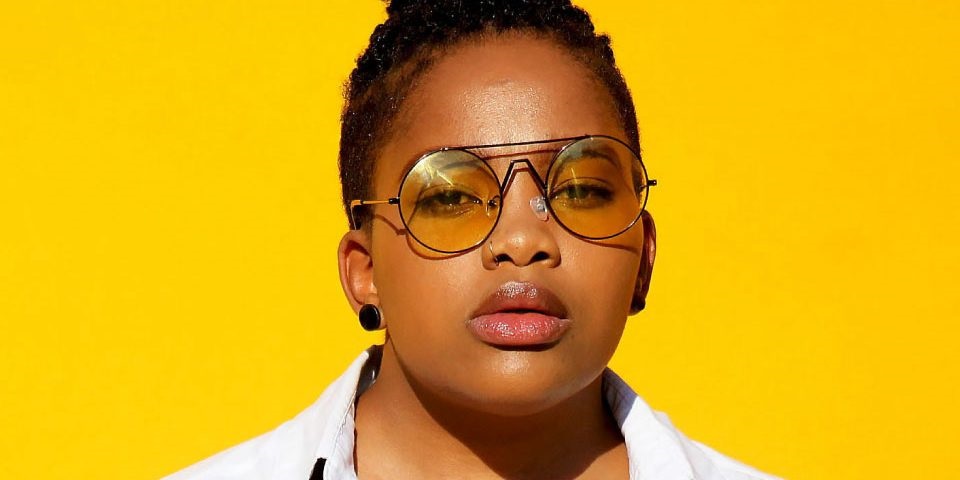Lungile Maquba, known to her friends and followers as Luh, is writing her own story. Born in October 1989, she grew up in Clemont Kwadabeka, a township within Durban, Kwa Zulu Natal. She was raised by her very strict grandmother together with her five younger siblings.
Poetry, photography and finding ways of expressing herself
Like many of us, her teen years were filled with questioning and finding her place in the world. Luh’s introspection came in the form of writing – she recorded her thoughts and feelings in her journals, only later sharing them with friends and realizing that her words spoke to others as well. Her poetry, focused on issues of empathy with women, children and innocence, was suffused with subtle aggression that her reality showed for these topics.
After matriculating from Durban Girls Secondary School, Luh followed a number of different paths while trying to find her career. From each job she held she took something important, from the customer service experience showing her that she loved interacting with and teaching people, to her work as a financial advisor that enabled her to her to understand the importance of finances. But the jobs themselves left her feeling unfulfilled, and at age 27 she bought herself her first professional camera and has worked as a photographer since then.
Getting started in activism
In 2017, Luh’s journey took another turn She was approached by Intersex South Africa and joined their team as a Coordinator, an experience that she says “helped me find my feet and my narrative on the kind of activism I align myself with and who I advocate for. Activism chose me at a time when I was mature enough to understand the extent that society goes to in silencing making different people extinct and shameful. It’s disgusting.” This opportunity assisted her to process her own questions she found herself confronted with, that she had always asked herself about why she was born different and being isolated because she wasn’t “normal” resurfaced.
Now an independent intersex activist, Luh uses her photography and her poetry to bring attention to issues that long remain hidden. She has documented experiences living in a women and children’s shelter, hosted an exhibition against women and child abuse, and organizes queer networking events and exhibitions. Luh uses her active social media presence to highlight her work and that of other queer artists and designers to a wider audience. She recently contributed poetry to “They Called me Queer”, a book of writings on the diverse experiences of African LGBTQIA+ individuals. She sees endless possibilities for connection and learning in today’s digital education and information environment. “When we remember who we are as a collective, we are powerful.”
What drives her activism
Fear of what will happen if we do not change keeps Luh involved in activism. “What drives me and keeps me within activism is the pain that most intersex people face in silence not just within their families, but within society as a whole. It’s painful to know that in all the struggles being fought for, very few people choose to fight for the human rights of intersex people, and it’s been years. It pains me to know that if nothing changes, many future children, teenagers, young adults and older intersex people will live in shame, secrecy, genital discomfort, bodily discrimination, no sex life let alone starting new families for themselves. It all pains me and I will do any and everything in my power to see to it that journey started by the late Sally Gross is not left to fade away silently in history books that not many will read.” She says an important part of keeping grounded in this work is to express anything that causes her to be uneasy. “It can be a person, a job, a project, or anything. If it doesn’t sit well, I speak, I vent and resolve. If there’s no resolution, I simply walk away. I have no bottles inside me to hold anything negative.”
Advice for allies to the intersex movement
When asked about what can allies do for the intersex movement, Luh suggests starting with education. She says, “the first step is for allies to create spaces where they want to learn about the lived realities of intersex people because knowing the definition of what an Intersex person means isn’t the end of the story. As there are many intersex variations, there are many intersex issues that each intersex individual face and once that surfaces, intersex people and allies can find different kinds of solutions and support to offer to the intersex community. I am here for this.”
You can follow Luh’s journey and learn more about her activism by following her on her various social media platforms:Instagram: https://www.instagram.com/lurighter/
Instagram: https://www.instagram.com/ub4tos/
YouTube: https://www.youtube.com/watch?v=Mc9fk5xBia0&feature=youtu.be











